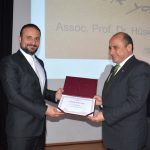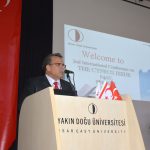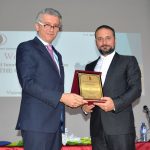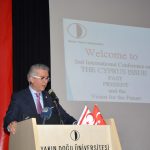
Ambassador Çağatay Erciyes: 'We are open to all kinds of new ideas as long as the political equality of the Turkish Cypriots is ensured”.
Hosted by Near East University, the Conference with International Participation on "Cyprus Issue: "The Vision Regarding the Past, Present and Future of Cyprus" where alternative models for solution in Cyprus will be discussed in detail, made a start with great participation.
The conference provides a 3 day lasting scientific platform for more than 50 scholars, diplomats, decision-makers, politicians, researchers and field experts from different countries to discuss many issues including the energy rivalry emerging recently due to potential hydrocarbon sources in the Eastern Mediterranean and the alternative solution models for Cyprus problem.
The Directorate of Press and Public Relations Office of Near East University released that the opening ceremony of the conference was realized with the participation of Çağatay Erciyes, the Deputy Director General for Department of Bilateral Political Relations and Maritime Affairs, Aviation and Borders, Ambassador and permanent representative of Turkish Foreign Ministry to the International Civil Aviation Organization (ICAO), Murat Başçeri, Turkish Ambassador to Nicosia, Tahsin Ertuğruloğlu, the Former Minister of Foreign Affairs, officials from Turkish Ministry of Foreign Affairs, the Principal Consultant and Undersecretary of the Embassy of Turkey to the Turkish Republic of Northern Cyprus, commanders, NEU Board of Trustees President Associate Professor Irfan Günsel, Yusuf Güngörür, the vice President of the Civil defense Organization, vice rectors, deans, academicians and foreign diplomats.
Prof. Dr. Gökçekuş: ’Alternative Solutions should be considered for the Future of the Turkish Republic of Northern Cyprus..."
Delivering the opening speech of the conference, the Conference Chairman Professor Hüseyin Gökçekuş reminded that the first conference on Cyprus Problem was held in 2001 adding that they had currently organized the second conference to provide a scientific platform to discuss the issue again in the light of important local and regional developments and to analyze how these affect the political solution process in Cyprus.
Underlining that the negotiations on Cyprus problem that conducted under the guidance of the United Nations since 1977 to achieve a bi-communal and bi-zonal federal partnership based on the political equality of the Turkish Cypriot and Greek Cypriot communities had failed, Professor Gökçekuş expressed his views: "An agreement couldn't be concluded in the last negotiations held in Crans-Montana, Switzerland in 2017 and the collapse of the Cyprus talks in Crans-Montana led to the entire collapse of political negotiations. After fifty years of failed negotiations, we believe it is time to think of alternative options for the future of the Turkish Republic of Northern Cyprus" said he.
Expressing that the discovery of hydrocarbons in the Eastern Mediterranean added an additional international dimension to the Cyprus problem, to the requirements of stability and cooperation in the Eastern Mediterranean Region, Professor Gökçekuş underlined that the natural resources were the common wealth of both peoples adding that the resources need to be used in the most appropriate way in a stable environment.

Assoc. Prof. Dr. Günsel: "A Just, Lasting and Viable Reconciliation that Protects the rights of Both Sides in Cyprus should be produced..."
In his opening remarks, the Honorary President of the Conference and the President of NEU Board of Trustees, Associate Professor Irfan Günsel stated that TRNC and Turkey were always in a sincere and constructive attitude for generating a just, lasting and viable reconciliation, which takes into account the legal rights of both parties in Cyprus.
Highlighting that a lasting and fair solution couldn't be achieved as long as only one of the parties had such an approach, Associate Professor Günsel stated that ignoring the rights of legitimate political equality of one of the parties wouldn't provide contribution to the solution.
Underlining the necessity of understanding and internalizing the fact that the Turkish Cypriot people would be the equal partner of any political, economic and social structure to be established in the future, Associate Professor Irfan Günsel stated that all institutions and organizations of the TRNC would continue to uphold this principle at all international platforms and would never allow the violation of the rights of the Turkish Cypriot community by anyone.
Highlighting that education was a field that knew no boundaries, Associate Professor Günsel stated that any final solution to be achieved in Cyprus should consider the future of universities, higher education and international students.
Ambassador Çağatay Erciyes: "We are open to all kinds of new ideas as long as the Political Equality of Turkish Cypriots is ensured..."
The Deputy Director General for Department of Bilateral Political Relations and Maritime Affairs, Aviation and Borders, the Ambassador and permanent representative of Turkish Foreign Ministry to the International Civil Aviation Organization (ICAO), Çağatay Erciyes stated that all negotiation processes that realized between the Turkish and Greek sides since 1968 and finally in 2017 in Crans-Montana had failed. "As long as the political equality and security needs of Turkish Cypriots are ensured, we are open to all kinds of new ideas," said he.
Underlining that the Greek side was in an uncompromising attitude despite the constructive attitude of Turkey and Turkish Cypriots, Erciyes expressed his views: ""The collapse of negotiations was inevitable as the solution expectations of the two parties in the island were different. The parties weren't actually discussing the same thing" said he.
"Negotiations will not be able to produce results as long as the Mentality of the Greeks does not change"
Highlighting that the last negotiation process in Crans-Montana was a clear indicator that Greek Cypriots ignored the political equality of Turkish Cypriots, Erciyes said: "This was also the same mentality leading not only to the collapse of the Republic of Cyprus only three years after its establishment in 1960 but also to the rejection of the Annan Plan by Greek Cypriots in 2004". Noting that the Greek side still refuses to recognize the political equality of the Turkish Cypriots, Erciyes stated that Greek Cypriot leader Nikos Anastasiadis still considered himself as the leader of a single state and qualified Turkish Cypriots as if they were minorities. Drawing attention to new concepts such as "loose federation" and "decentralization" proposed by Anastasiadis, Erciyes underlined that the Greek Leader hadn't taken a concrete step within the frame of his suggestions, which require clear definition to put substance on what they mean.
"As long as there is no change in this mentality, negotiations will not produce a result that will bring benefits for both sides. For this reason, Turkey argues that a negotiation process, which is not a result-oriented one and which has unclear parameters, is no longer possible" noted he.
"We have been negotiating for a federation-based solution for almost half a century. We couldn't achieve any conclusion. In this case, we need to reconsider our goals again. Under current conditions, we do not exclude the federation model and we do not insist on a particular model. In his latest report, UN Secretary General (Antonio) Guterres pointed to 'new ideas' for the solution of the Cyprus problem. In this context, we are open to all kinds of new ideas as long as the political equality and security needs of the Turkish Cypriots are ensured" noted he.
"We have to agree on what and how to negotiate..."
Underlining the key role of a healthy dialogue process in achieving a comprehensive result, Erciyes stated that they continued to non-official talks in this context and they also shared the vision of the Turkey and Turkish Cypriot side with Jane Holl Lute, Guterres' Cyprus Envoy.
Underlining that it was not possible to progress in negotiations without having a solid common ground, Erciyes continued his remarks: "Before starting a new negotiation process, we have to decide what principles the process will be built on. In other words, we have to agree exactly what and how to negotiate. Therefore, the new negotiation process needs to be well prepared before. We don't want to start negotiations just for negotiations. We know that the UN Secretary General has the same view. None of us can tolerate another failure. "
"Turkey's Guaranty is more vital than ever before"
Drawing attention to the fact that the Greek side focused the negotiations on the guaranty and security issues, Erciyes stated that the Greek side acted as if the right of guaranty of Turkey was a factor preventing a solution for Cyprus problem. "This is entirely the distortion of the truth" said he.
Highlighting that Turkey's guaranty was more vital than ever before, Erciyes stated a negotiation process would not be gone into without ensuring the requirement of security and guarantee. Erciyes noted that Turkey would continue to demand her right of guaranty till she knows for sure that the political equality of Turkish Cypriots, who are the co-owners of the island, is ensured on a solid basis.
"Hydrocarbon Issue is another example of the Narrow-Minded Approach..."
Reminding that the Greek Cypriot side was carrying out unilateral exploration activities regarding the hydrocarbon reserves around Cyprus, Ambassador Erciyes stated that the hydrocarbon issue was another example of the narrow-minded approach that Greek Cypriots exhibited during the last 50 years in the negotiations.
Underlining that the region fell into a further instability due to irresponsible activities of the Greek Cypriots, Erciyes expressed his views: "In fact, hydrocarbon reserves can easily be used as a stabilizer factor in the region. In this regard, at the very beginning, Turkey had warned the Greek Cypriots about sharing the natural resources of the island with Turkish Cypriots. However, Greek Cypriots preferred to carry out unilateral activities".
Erciyes stated that Turkish Cypriots need to be equally involved in political decision-making mechanisms concerning hydrocarbon issue. Highlighting that Turkey was determined to protect her interests and rights on Turkey's continental shelf in the Eastern Mediterranean, Erciyes stated that Turkey would continue to provide support to Turkish Cypriots under all circumstances. He underlined that the rising tension in the Eastern Mediterranean was a clear indicator of the necessity of a sustainable solution in Cyprus.



